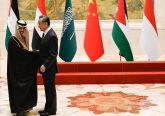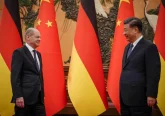The 2023 BRICS Summit: A Mixed Bag for China
Chinese President Xi Jinping’s visit to the 15th BRICS (Brazil, Russia, India, China, and South Africa) Leaders’ Summit in Johannesburg, South Africa from August 21-24 encompassed both diplomatic successes and self-inflicted setbacks. While China effectively championed BRICS expansion, missteps by the Chinese delegation detracted from the trip’s achievements.
Beijing sees BRICS as key to engaging the Global South and countering the West
China sees BRICS as a valuable and unique mechanism for engaging with the Global South. In July 2023, ahead of the BRICS summit, China’s top diplomat Wang Yi described BRICS as “the most important platform for cooperation among emerging markets and developing countries.” BRICS summits allow Chinese officials to interact with partners from developing nations on the sidelines. Xi Jinping took full advantage of this during the recent summit by holding one-on-one meetings with the leaders of ten countries, including Bangladesh, Cuba, Ethiopia, and Iran. Xi also co-chaired the China-Africa Leaders’ Dialogue with South African President Cyril Ramaphosa, during which he announced new initiatives to support Africa’s industrialisation, agricultural modernisation, and talent development.
Chinese officials relish the opportunities offered by BRICS to portray China as a champion of the developing world. Xi Jinping emphasised this role during a speech at the 2023 BRICS summit, declaring that “China has always shared the same breath and destiny with the developing countries… and will forever be a member of the developing countries!” Beijing particularly enjoys the outsized influence that its economic size affords. In 2022, China accounted for nearly 70 per cent of BRICS’ collective GDP.
Most importantly, Beijing sees BRICS as a crucial mechanism to counter the global influence of the G7, which comprises the world’s largest democratic, advanced economies: Canada, France, Germany, Italy, Japan, the United Kingdom, and the United States.
However, BRICS has so far failed to translate its collective economic heft into a full political counterweight to the G7. BRICS countries have long sought to strengthen the economic security of developing countries by establishing alternative economic institutions—chief among them the New Development Bank—and reducing the dominance of the U.S. dollar in international trade and finance. Despite these efforts, the U.S. dollar is still the global currency of choice, and the euro, pound, and yen remain ahead of the Chinese renminbi (RMB) by many measures. As of July 2023, the U.S. dollar was used in 46 percent of global payments, according to the interbank messaging network SWIFT. The RMB was used in only 3 per cent of global payments.
Chinese experts acknowledge BRICS’ shortcomings compared to the G7. A Chinese economist recently noted that the G7’s influence stems from its ability to “speak with one voice,” which enables the group to significantly shape global discourse. Key to the G7’s success is the fact that the group is made up entirely of liberal democratic states that see eye-to-eye on many fundamental issues. By contrast, the BRICS countries have different political systems, with China and Russia being authoritarian while the others are democracies.
India is the biggest obstacle for China within the BRICS. Sino-Indian relations have been tense in recent years, marked by dangerous standoffs on their contested border and India’s pushback against China across several vectors, including the blocking of hundreds of Chinese mobile apps. Most significantly, India has responded to China’s growing assertiveness by strengthening ties with the United States, Japan, and Australia through the Quadrilateral Security Dialogue (or the Quad).
China drives BRICS expansion for its own benefit
The recent BRICS summit was an opportunity to breathe new life into the bloc by expanding its membership. In the runup to the summit, there were signs that BRICS leaders would establish a framework for inviting new members. In July, China’s Wang Yi met with Indian Minister of External Affairs Subrahmanyam Jaishankar, and the summary readout highlighted that “the two sides reached a principled consensus on launching the process of BRICS membership expansion.”
The group surprised many analysts by going further than just discussing the process of expansion. In the joint declaration at the end of the summit, it formally invited six countries to join BRICS starting in 2024: Argentina, Egypt, Ethiopia, Iran, Saudi Arabia, and the United Arab Emirates (UAE). This was only the second time that new members have been invited to join the group—the first was when South Africa joined in 2010. In addition to the six invited countries, several others have expressed interest in joining the group.
China has been one of the strongest proponents of the group’s expansion. Wang Lei, Director of the Center for BRICS Cooperation Studies at Beijing Normal University, notes that BRICS’ expansion has attracted attention recently because the grouping has already been engaging several key developing countries, and he argues that the group’s expansion will add to the “charisma” of BRICS. Wang adds that “blocization” is a growing trend in international politics, and that existing global leaders will be challenged by the growing unity of developing countries.
Enlargement could indeed increase the influence of BRICS on the global stage. The six new members will expand the grouping’s total GDP by around 13 per cent, from $25.9 trillion to nearly $29.2 trillion (based on 2022 levels). This will bring the group closer to closing the gap with the G7, which in 2022 had a collective GDP of $43.8 trillion. Notably, the addition of new countries will benefit China more than it will the other original members. While the other members will see their already-slim share of the group’s economic size further diluted, China will still account for over 60 per cent of the group’s total GDP.
There will be other benefits as well. The addition of Saudi Arabia and the UAE will be particularly significant in terms of BRICS’ influence over global energy supplies. The original five countries already account for a sizable share of the world’s energy supplies—especially coal. Once new members officially join, the expanded group will produce over 42 per cent of global oil supplies and 37 per cent of the world’s gas (Note: Oil figures are based on 2022 production; gas and coal figures are based on 2021 production levels).
This is particularly welcome news for China, the world’s largest energy consumer. Amid rising geopolitical tensions, Beijing has become increasingly concerned about securing access to energy, food, and other materials. The inclusion of key resource-rich countries in the BRICS could afford Beijing a greater sense of security on this front.
It is worth noting that expansion may be a double-edged sword for BRICS. The addition of six new members will complicate the group’s ability to reach a consensus on contentious matters, exacerbating a weakness already identified by Chinese scholars. Yet Beijing’s support for expansion indicates that Chinese leaders have assessed that it will be a net gain for China. One reason for this is that it will provide Beijing with new opportunities to engage bilaterally or trilaterally with new countries in the grouping, such as Iran and Saudi Arabia. This would be reminiscent of the opportunities that the Quad has brought the United States to engage bilaterally and trilaterally with the other members of that grouping.
Mistakes and obfuscation distract from Chinese successes
While China successfully garnered support for the group’s historic expansion, the Chinese delegation also made rare high-profile blunders. These distracted from Beijing’s successes and drew unwanted attention to Xi Jinping.
On the opening day of the summit, Xi unexpectedly skipped a business forum, where he was scheduled to speak. Xi’s counterparts from the other BRICS countries were in attendance. Even Russian President Vladimir Putin, who was unable to attend the summit in person due to an international arrest warrant, addressed the forum virtually. But Xi sent his Commerce Minister, Wang Wentao, in his place.
Chinese officials gave no explanation for Xi’s absence and went to great lengths to conceal it. Postings on the Ministry of Foreign Affairs (MFA) website make no mention of Wang Wentao delivering the speech in Xi’s place. Even more cryptically, MFA official Hua Chunying tweeted that “Xi delivered an address” and she accompanied the post with a picture from the back of the venue that did not show Xi.
Beijing’s lack of transparency throughout the affair drew immediate comparisons with the disappearance of Qin Gang and his removal from the post of foreign minister over the summer. The Chinese authorities gave no explanation for that dramatic move, and it highlighted the opaque nature of Chinese politics. It is worth noting that Qin Gang’s disappearance also had an impact on China’s approach to the BRICS summit. Qin would presumably have attended meetings with his counterparts in preparation for the August leaders’ summit, but instead the Foreign Ministry sent Vice Foreign Minister Ma Zhaoxu.
These self-inflicted harms will not seriously threaten Beijing’s foreign policy ambitions, but they may worsen already-negative global perceptions of China and Xi Jinping. Public opinion polling by the Pew Research Center shows considerable negative views of China in 2023, even among some BRICS countries. Two-thirds of Indian respondents had unfavourable views of China—up from less than half in 2019—and just under half of those polled in Brazil viewed China negatively—up from only one-quarter in 2019. Views of Xi are similarly negative. Two-thirds of Brazilian respondents said they had little or no confidence in Xi to “do the right thing regarding world affairs.” In India and Argentina (which is slated to join BRICS in 2024), over half of respondents had little or no confidence in Xi.
Nevertheless, China’s size and influence make it impossible for BRICS countries to ignore. Beijing is likely to continue to make gains within the bloc in the coming years as it brings in friendly partners. China will probably push for further expansion of the group beyond the six new members, and it will likely succeed on this front.







